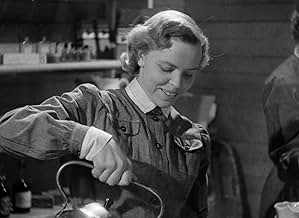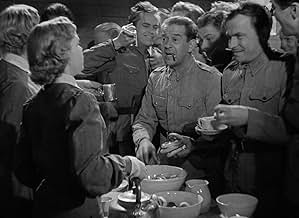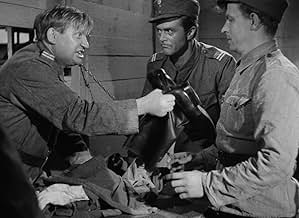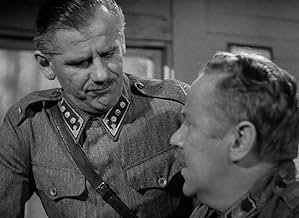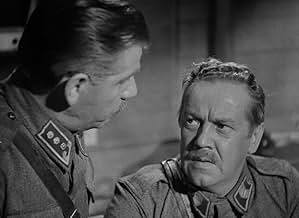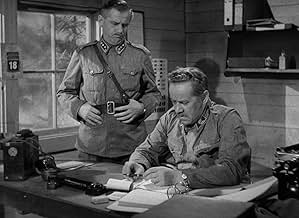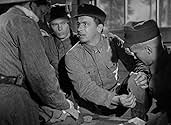CALIFICACIÓN DE IMDb
8.0/10
8 k
TU CALIFICACIÓN
Agrega una trama en tu idiomaThe tale of a platoon of soldiers during the Continuation War. Based on Väinö Linna's book of the same name.The tale of a platoon of soldiers during the Continuation War. Based on Väinö Linna's book of the same name.The tale of a platoon of soldiers during the Continuation War. Based on Väinö Linna's book of the same name.
- Dirección
- Guionistas
- Elenco
- Nominada a1 premio BAFTA
- 7 premios ganados y 1 nominación en total
- Dirección
- Guionistas
- Todo el elenco y el equipo
- Producción, taquilla y más en IMDbPro
Opiniones destacadas
Tuntematon sotilas (The Unknown Soldier) is an epic story and part of Finland's history. The movie is based on famous Finnish novel by Väinö Linna, and it is set in the Continuation War (1941-44), just about a year after the Winter War, between Finland and Soviet Union. The movie is fully black and white.
The Unknown Soldier focuses on a very diverse group of soldiers and is packed with black humour. The different Finnish dialects, that make a huge part of the fun in the jokes, are understandable only for people who know Finnish, but the overall feeling is there in the amazing acting by Reino Tolvanen (Rokka), Kosti Klemelä (Koskela) and Pentti Siimes (Määttä) - to name a few. The most powerful scene is probably the one where Lehto, Määttä and Rahikainen are stubbornly serving their disciplinary duty after refusing to obey their superiors - directly under the enemy aerial fire.
The Unknown Soldier is one of the most realistic war movies ever made. It shows the horrible facts: people die for their home land and it's not pretty. The Finnish soldiers fight against the tenfold enemy in impossible situations. They made heroic acts in their attempt to save their country, and many of these acts have been captured brilliantly in the movie as well. But the true fact of war - death - is always around, even among the war heroes. War does not make one great.
The teaching of The Unknown Soldier is that even a small country has a chance in war against an impossible enemy if the will to protect the homeland is strong enough, the people are stubborn enough and are ready to die for freedom.
The main music in the film - Jean Sibelius' Finlandia is legendary.
The Unknown Soldier focuses on a very diverse group of soldiers and is packed with black humour. The different Finnish dialects, that make a huge part of the fun in the jokes, are understandable only for people who know Finnish, but the overall feeling is there in the amazing acting by Reino Tolvanen (Rokka), Kosti Klemelä (Koskela) and Pentti Siimes (Määttä) - to name a few. The most powerful scene is probably the one where Lehto, Määttä and Rahikainen are stubbornly serving their disciplinary duty after refusing to obey their superiors - directly under the enemy aerial fire.
The Unknown Soldier is one of the most realistic war movies ever made. It shows the horrible facts: people die for their home land and it's not pretty. The Finnish soldiers fight against the tenfold enemy in impossible situations. They made heroic acts in their attempt to save their country, and many of these acts have been captured brilliantly in the movie as well. But the true fact of war - death - is always around, even among the war heroes. War does not make one great.
The teaching of The Unknown Soldier is that even a small country has a chance in war against an impossible enemy if the will to protect the homeland is strong enough, the people are stubborn enough and are ready to die for freedom.
The main music in the film - Jean Sibelius' Finlandia is legendary.
The Unknown Soldier is really more than just a movie. It is a monument. The two wars between Finland and Soviet is so deeply rooted in the mythology of the Finnish country that it would be utterly pointless to limit yourself to the pure cinematic qualities, if you were to appreciate this film. The film really embodies a cinematic continuation of a big statue honoring the soldiers that fought and died in these battles, carved in stone to stand forever. To this day, this is still the most successful Finnish film ever made, and Finnish TV has been airing it every Independence day for over a decade. And that is only the movie, which despite all it's values is most important as an appendix to Väinö Linnä's classic novel of the same name. The 1954 novel is truly a masterpiece of realistic fiction, and the film is really just following it's trails. It is a fine war epic, but all it's virtues stem from the original novel. That is why I'm making a point of how to approach this film. This isn't just a story about the war, this is a film about a country, being important in itself, depicting a unique piece of Finnish history exclusive for Finland.
That being said, the big thing that the film brings onto the viewer is it's big heart. This is an epic in the most classic of fashions, presenting a kind of sentimental warmth and heartbreaking honesty that only cinema can create. The psychological reality of the novel is apparent in it's narrative, using no main characters but various ones, all diverse, realistic and totally present. Film is a medium that can't really enter the human mind with such piercing accuracy, thus the film takes use of some astonishing actors letting them hammer out their characters with spellbinding presence. To say that the film is character driven isn't really accurate, it's character BASED. When we meet our first batch of characters, we expect their happy smiles to be turned into war torn frowns. But the jokers of the group insist on keeping the mood as good as possible, no matter what fate may fall upon them. One of them, the cheerful Koskela (Kosti Klemälä) even ends up becoming Sergeant after a death-defying attack on a tank, but it's no big deal as long as they don't call him 'Sir'. Other characters are more serious minded, like Rokka (Reino Tolvanen), a man twice the age of most of the other soldiers, who's got wife and children at home. He is humorous and lovable, yet fearless and completely consequent in his role as a fighter, and he has only contempt for his so-called duty of discipline. He is the best soldier in the group, we learn, yet the biggest problem for the higher ranks who disapprove of his ways. Tolvanen is furious in the role, almost resembling a Finnish Toshiro Mifune, becoming the unified center of the soldier's morality.
These are just two examples of many characters that come and go during the film. I feel I have to mention the great Åke Lindman who portrays Lehto, a nihilist killing machine who seems to have leather skin and a heart of stone. As a dark version of Clint Eastwood he will never laugh, never cry, and he will defy death until the day it gets the better of him. Yet, as stereotypical as these characters may seem, you are never quite sure if they really are as happy, brave, cowardly or honest as they seem - indeed, in Linna's original version of the novel, Lehto was portrayed as a suicidal psychopath.
Running for three hours without a traditional plot narrative, The Unknown Soldier is filled with memorable sequences worthy that of a proper epic. One short scene involves three soldiers exchanging words with two Russian women, ending up with a wild Kalinka dance. In another sequence, all the soldiers get drunk and have a party when they should be on guard for enemies and, as it happens, they are lucky enough not to get ambushed by any russians. In one scene the soldiers witness an execution to warn them about the dangers of disobedience. In another, three soldiers punished with two hours of standing guard hold their stand despite bomb planes are hovering above them, attacking the camp.
These are basically war stories, anecdotes strung together and you get the feeling the film might as well keep telling them for another three hours, because the well doesn't dry up. These stories are the body of the Finnish war history, and for every soldier who fought in the war there's bound to be hundreds. These are as good as any, and it is when you consider the weight of this event that it becomes clear just what a monument the film is. The music seals the legacy - Jean Sibelius' opus for the epic, Finlandia.
That being said, the big thing that the film brings onto the viewer is it's big heart. This is an epic in the most classic of fashions, presenting a kind of sentimental warmth and heartbreaking honesty that only cinema can create. The psychological reality of the novel is apparent in it's narrative, using no main characters but various ones, all diverse, realistic and totally present. Film is a medium that can't really enter the human mind with such piercing accuracy, thus the film takes use of some astonishing actors letting them hammer out their characters with spellbinding presence. To say that the film is character driven isn't really accurate, it's character BASED. When we meet our first batch of characters, we expect their happy smiles to be turned into war torn frowns. But the jokers of the group insist on keeping the mood as good as possible, no matter what fate may fall upon them. One of them, the cheerful Koskela (Kosti Klemälä) even ends up becoming Sergeant after a death-defying attack on a tank, but it's no big deal as long as they don't call him 'Sir'. Other characters are more serious minded, like Rokka (Reino Tolvanen), a man twice the age of most of the other soldiers, who's got wife and children at home. He is humorous and lovable, yet fearless and completely consequent in his role as a fighter, and he has only contempt for his so-called duty of discipline. He is the best soldier in the group, we learn, yet the biggest problem for the higher ranks who disapprove of his ways. Tolvanen is furious in the role, almost resembling a Finnish Toshiro Mifune, becoming the unified center of the soldier's morality.
These are just two examples of many characters that come and go during the film. I feel I have to mention the great Åke Lindman who portrays Lehto, a nihilist killing machine who seems to have leather skin and a heart of stone. As a dark version of Clint Eastwood he will never laugh, never cry, and he will defy death until the day it gets the better of him. Yet, as stereotypical as these characters may seem, you are never quite sure if they really are as happy, brave, cowardly or honest as they seem - indeed, in Linna's original version of the novel, Lehto was portrayed as a suicidal psychopath.
Running for three hours without a traditional plot narrative, The Unknown Soldier is filled with memorable sequences worthy that of a proper epic. One short scene involves three soldiers exchanging words with two Russian women, ending up with a wild Kalinka dance. In another sequence, all the soldiers get drunk and have a party when they should be on guard for enemies and, as it happens, they are lucky enough not to get ambushed by any russians. In one scene the soldiers witness an execution to warn them about the dangers of disobedience. In another, three soldiers punished with two hours of standing guard hold their stand despite bomb planes are hovering above them, attacking the camp.
These are basically war stories, anecdotes strung together and you get the feeling the film might as well keep telling them for another three hours, because the well doesn't dry up. These stories are the body of the Finnish war history, and for every soldier who fought in the war there's bound to be hundreds. These are as good as any, and it is when you consider the weight of this event that it becomes clear just what a monument the film is. The music seals the legacy - Jean Sibelius' opus for the epic, Finlandia.
I haven't ever heard such incomprehensible gibberish in my life. The Unknown Soldier (Tuntematon Sotilas) is not Soviet propoganda but a poignant and still very relevant look at the inhumanity of war. It is probably the only film that takes place during the little known Continuation War (1941-44), the sequel to the also little known Winter War (1939-40). Unlike Talvisota, the other great Finnish war movie, some knowledge of the chronology and background to this conflict is required. In 1941, Finland mobilized its forces along the 1940 armistice line incurring the wrath of the Soviet Union which bombed several Finnish cities in response. Operation Barbarossa, the German invasion of the Soviet Union, began shortly after. With most Soviet forces tied down in defending the motherland against the Germans, Finland seized the opportunity and reoccupied the land it had lost in the previous war. The plucky Finns made significant gains until the war entered its 'static phase' with neither side giving or taking any ground for nearly 2 years. The Finns did, however, refuse to link up with the Germans at Stalingrad which consequently may have cost Germany (and Finland) the war. There was a color remake of this film but in my opinion, this appears to be the superior version. If you can get a copy of the novel in English, I would recommend reading that as well.
10thomsohl
Being a swede myself and reading politi kasses interpretation of this movie as soviet propaganda makes me embarrassed. Of course it isn't! Probably he has never seen a soviet propaganda movie? Talking about propaganda I would say "Band of Brothers" contains more American propaganda than this movie contains soviet propaganda - even though Band of Brothers is a fantastic creation. I always find it refreshing to see war movies from other countries than USA. Often the consequences and moral issues of war are more much more interesting. Almost everyone in Europe knows somebody who fought in the war or suffered the consequences. Europeans saw their continent blow into pieces. Thats why we love anti-heroic movies like Das Boot and Stalingrad - and this one. By the way, how often do you see Finnish soldiers in movies? 10 out of 10.
Over the decades, Väinö Linna's The Unknown Soldier (1954) has become one of the most popular and beloved Finnish novels of all time, despite initial criticism and controversy about the naturalistic and gritty portrayal of the soldiers' life on the front. When the book was understandably very quickly adapted to the big screen, the directing duties were given to Edvin Laine who would later go on to direct the film adaptations of Linna's epic novel trilogy Here Under the North Star as well. Like the book, the film has become one of the cornerstones of Finnish fiction: the film is shown on television every Independence Day and the book is widely read in schools. Having read the novel twice and seen the movie several times, I can confirm that their classic reputations are very much deserved.
Set during the Continuation War (1941-44), The Unknown Soldier tells the story of a machine gun company consisting mostly of young inexperienced men from all around Finland. At the beginning, the drafted men cheerily leave for the front when the war between Finland and the USSR breaks out again after the brief Interim Peace era. Gradually they grow more and more disillusioned with their chances of ever winning the war and a grudge against the strict commanding officers grows among the company. Battle after battle old friends are killed and new soldiers brought to the front, but the men have only their own spirit to trust.
The character gallery is too numerous to be listed entirely, but all the soldiers have their place in the story and many have become commonly referenced archetypes of different types of Finnish men. It is difficult for me to pick my favourites among them, but the most essential ones include at least Antti Rokka (Reino Tolvanen), an older and very skilled soldier with an anti-authoritarian attitude, Koskela (Kosti Klemelä), a calm and respected platoon leader, and the highly uptight and often ridiculed company commander Lammio (Jussi Jurkka). Particularly Rokka has reached a legendary status in Finnish culture; his rich Karelian dialect, self-confident antics and superior skills mix excellently into an extremely entertaining and often laugh-out-loud funny character. On the other hand, Koskela and Lammio can be seen as the two opposites of leader types; in their personas, practical and theoretical approaches to leadership often clash, even if Koskela would prefer his men to not constantly provoke his superiors' anger.
At the risk of the review becoming too list-like, I cannot leave some other great characters without a mention. The personalities range from the always cheery Vanhala and Hietanen (Leo Riuttu and Heikki Savolainen) to the brooding and menacing Lehto and Lahtinen (Åke Lindman and Veikko Sinisalo), the frightened Riitaoja (Olavi Ahonen), the hilariously eccentric Honkajoki (Tarmo Manni), the business-savvy Rahikainen (Kaarlo Halttunen) and the idealistic Kariluoto (Matti Ranin). The men's diverse dialects are probably mostly lost in translation, but for Finnish-speaking viewers they provide one of the main charms of the whole film; personally I enjoy especially Rokka and Rahikainen's wide Karelian way of speech. Despite the excellent performances, I have to agree with the common criticism against the film: a lot of the actors are obviously too old for their roles and subsequently their behaviour seems overly juvenile at many points. Also, due to this the young men's age difference to the experienced Rokka is not as clear as it is said to be. The age issue does not ruin the experience though, not at all; most of the veteran actors handle their roles magnificently. The memorable performances also help the viewer to distinguish the characters from each other, as the downside of having a large cast is that the film may seem difficult to follow to those who have not read the book.
Like many screen-versions of famous novels, the film downplays the importance of the characters' inner thoughts and focuses more on the action-driven plot which is followed pretty faithfully even though some characters and subplots have been dropped. I especially wish the sadistic relationship of Lehto and Riitaoja was paid more attention in the film as it has always been one of my favourite aspects of the novel, but luckily the spectacular action scenes make up for the thinner characters. The explosions, weaponry, artillery and tanks look very authentic, making especially the final crescendo of chaotic turmoil very impressive. Many other iconic moments also belong among the most famous scenes in Finnish cinema: Lehto's big solution, Rokka single-handedly taking down dozens of Russians with a submachine gun, the tragic demise of one of the main characters in a burning ambulance... However, many of the smaller death scenes have come to look rather theatrical and oddly bloodless by modern standards. In any case, the character chemistry is excellent, thanks to Linna's writing and the charismatic actors.
Jean Sibelius' Finlandia beautifully bookends the visually gorgeous masterpiece that never feels boring despite the runtime of nearly three hours – both entertaining and serious, The Unknown Soldier belongs without a doubt among the most essential of Finnish films ever made.
Set during the Continuation War (1941-44), The Unknown Soldier tells the story of a machine gun company consisting mostly of young inexperienced men from all around Finland. At the beginning, the drafted men cheerily leave for the front when the war between Finland and the USSR breaks out again after the brief Interim Peace era. Gradually they grow more and more disillusioned with their chances of ever winning the war and a grudge against the strict commanding officers grows among the company. Battle after battle old friends are killed and new soldiers brought to the front, but the men have only their own spirit to trust.
The character gallery is too numerous to be listed entirely, but all the soldiers have their place in the story and many have become commonly referenced archetypes of different types of Finnish men. It is difficult for me to pick my favourites among them, but the most essential ones include at least Antti Rokka (Reino Tolvanen), an older and very skilled soldier with an anti-authoritarian attitude, Koskela (Kosti Klemelä), a calm and respected platoon leader, and the highly uptight and often ridiculed company commander Lammio (Jussi Jurkka). Particularly Rokka has reached a legendary status in Finnish culture; his rich Karelian dialect, self-confident antics and superior skills mix excellently into an extremely entertaining and often laugh-out-loud funny character. On the other hand, Koskela and Lammio can be seen as the two opposites of leader types; in their personas, practical and theoretical approaches to leadership often clash, even if Koskela would prefer his men to not constantly provoke his superiors' anger.
At the risk of the review becoming too list-like, I cannot leave some other great characters without a mention. The personalities range from the always cheery Vanhala and Hietanen (Leo Riuttu and Heikki Savolainen) to the brooding and menacing Lehto and Lahtinen (Åke Lindman and Veikko Sinisalo), the frightened Riitaoja (Olavi Ahonen), the hilariously eccentric Honkajoki (Tarmo Manni), the business-savvy Rahikainen (Kaarlo Halttunen) and the idealistic Kariluoto (Matti Ranin). The men's diverse dialects are probably mostly lost in translation, but for Finnish-speaking viewers they provide one of the main charms of the whole film; personally I enjoy especially Rokka and Rahikainen's wide Karelian way of speech. Despite the excellent performances, I have to agree with the common criticism against the film: a lot of the actors are obviously too old for their roles and subsequently their behaviour seems overly juvenile at many points. Also, due to this the young men's age difference to the experienced Rokka is not as clear as it is said to be. The age issue does not ruin the experience though, not at all; most of the veteran actors handle their roles magnificently. The memorable performances also help the viewer to distinguish the characters from each other, as the downside of having a large cast is that the film may seem difficult to follow to those who have not read the book.
Like many screen-versions of famous novels, the film downplays the importance of the characters' inner thoughts and focuses more on the action-driven plot which is followed pretty faithfully even though some characters and subplots have been dropped. I especially wish the sadistic relationship of Lehto and Riitaoja was paid more attention in the film as it has always been one of my favourite aspects of the novel, but luckily the spectacular action scenes make up for the thinner characters. The explosions, weaponry, artillery and tanks look very authentic, making especially the final crescendo of chaotic turmoil very impressive. Many other iconic moments also belong among the most famous scenes in Finnish cinema: Lehto's big solution, Rokka single-handedly taking down dozens of Russians with a submachine gun, the tragic demise of one of the main characters in a burning ambulance... However, many of the smaller death scenes have come to look rather theatrical and oddly bloodless by modern standards. In any case, the character chemistry is excellent, thanks to Linna's writing and the charismatic actors.
Jean Sibelius' Finlandia beautifully bookends the visually gorgeous masterpiece that never feels boring despite the runtime of nearly three hours – both entertaining and serious, The Unknown Soldier belongs without a doubt among the most essential of Finnish films ever made.
¿Sabías que…?
- TriviaThe film has been traditionally shown on TV in Finland every year on Independence Day (December 6) since the year 2000.
- ConexionesEdited into Juoksuhaudantie (2004)
- Bandas sonorasFinlandia
by Jean Sibelius
Selecciones populares
Inicia sesión para calificar y agrega a la lista de videos para obtener recomendaciones personalizadas
- How long is The Unknown Soldier?Con tecnología de Alexa
Detalles
Taquilla
- Presupuesto
- FIM 46,667,761 (estimado)
- Tiempo de ejecución2 horas 57 minutos
- Color
- Relación de aspecto
- 1.37 : 1
Contribuir a esta página
Sugiere una edición o agrega el contenido que falta

Principales brechas de datos
By what name was El soldado desconocido (1955) officially released in Canada in English?
Responda
